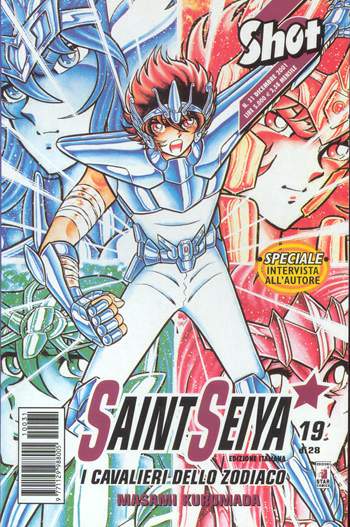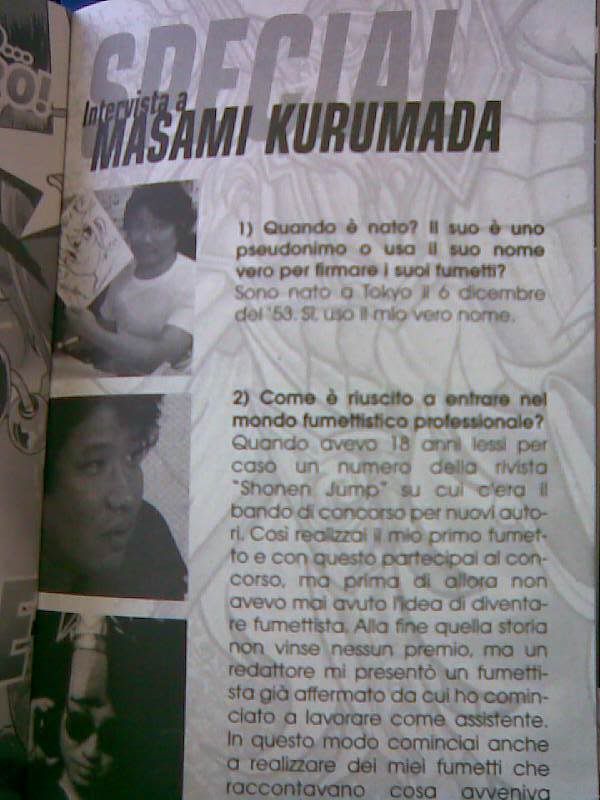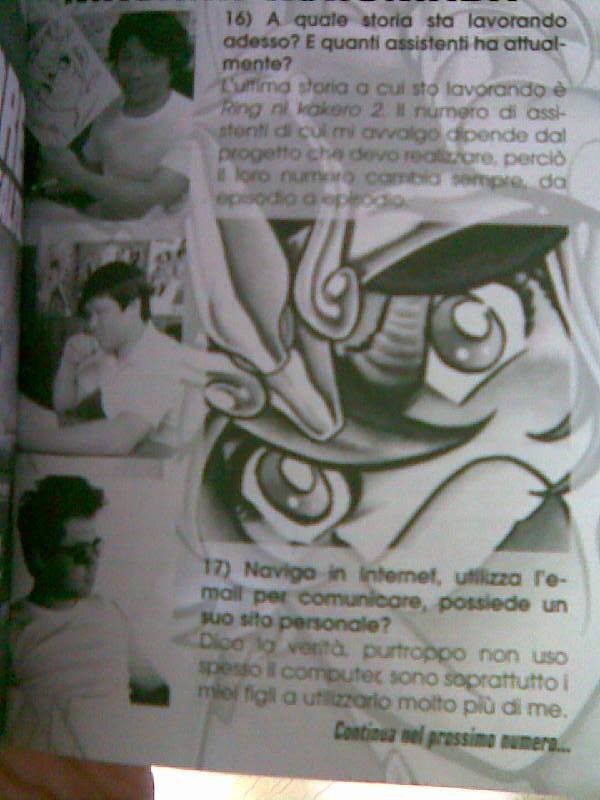|
|

SPECIALE INTERVISTA ALL'AUTORE was an interview to Kurumada asked by STARCOMICS, the Italian publisher of SaintSeiya manga.
It was published in parts in the 19th volume and the following ones.
some shots by me:


a transcription in original language can be found here:
http://www.cdzmillennium.altervi ... d=info/kurumada.htm
I made a translation from Italian to English.
Please, would someone turn it in Chinese? thanx! [s:158]
1) When were you born? Is yours a pseudo or do you use your real name to sign yours comics?
I was born in Tokyo on 6th December 1953. Yes, I use my real name.
2) How did you manage to get into the circle of professional comics?
When I was 18 when I read by change a number of the magazine "Shonen Jump", on which there was competition for new authors. Thus I made my first comic, and I participated in the contest with it, but before that I had never had the idea of ​​becoming a mangaka. At last that story didn't win any prizes, but an editor introduced me to a well-known cartoonist I started working as an assistant with. This way, I also began to make my own comic that told what was happening in the studio where I worked.
3) What was the first comic you read? What did you like in your youth?
I can't remember the first comic I ever read, but when I was in the third year of elementary school I liked Tetsuwan Atom (Astro Boy) and Iga no Kagemaru. I was very influenced by the master Hiroshi Motomiya: after all, his works were really pushing me to become a mangaka.
4) What was the name of the first story you made?
I made my debut with a manga titled Sukeban Arashi, it was a comic story.
5) Have you ever worked as an assistant?
I entered the world of comics without any technical expertise. While working as an assistant I was able to learn the basic techniques, but due to my lack of preparation I've committed many errors.
6) How the story of Saint Seiya was born?
At the beginning I conceived of a story whose main character was a guy who fought with the techniques of karate. Then I develop fight scenes where lightning and sparks appeared every time an attack was launched, and it seemed interesting to me. So I said that without an armor, the body of the protagonists would have affected by many damages, thus the concept of ​​Cloth was born. But if in karate it had been used whatever armor, aesthetically the result wouldn't be very enjoyable, therefore I changed my mind ​​by creating more refined armors. Combining all these ideas to the Greek mythology I managed to create a new story. As I invented words like Seitoshi (Saint = Holy Warrior) and Sei (Cloth = Sacred Armor) the story soon began to develop itself in my head. After having decided about the protagonist, the other characters were created as a matter of course, along with the story itself.
7) Who are your favourite characters?
Everyone in this story. I created them, so I'm attached to all, I can't choose someone among,
8)l Before Saint Seiya, which story did you made?
A manga titled Otoko Zaka.
9) Do you write your stories relying on personal experiences, or on data you have collected for?
The characters I made are my alter ego, so I think they reflect my experiences in their behaviour, although in few aspects. But overall, while I write a story, hardly ever I think this sort of thing, I just think about how I can make it more interesting to readers, thus it never happens to make a story that tells just my experiences. Regarding to the data, I never use to collect them on purpose to create a story, but during every day life I pledge to analyze Western or Chinese art books, particularly India ink works, then I read historical novels, or other books that interest me.
10) It should have been very hard produce every week an episode of Saint Seiya. Could you talk about?
Working for a weekly magazine is really hard, especially creating a new episode every week is a very difficult job.
11) How do you usually work? How many days does it take to make the storyboard and how many for the boards of an episode?
It's a secret ...
12) Before showing the boards to your editor, do you seek advice by somebody?
For a cartoonist, his editor is the first reader, so don't ask anyone else, than him. I seldom talk in an interview about ideas I have for a story, while I ponder on a new story, I carry out several changes on, by adding the most interesting ideas that have come later. Thus the final outcome is often very different from what I had said earlier.
13) Do you make any change to the panels published in the magazine as the chapters are collected in tankobon?
The only alteration I'd happen to make affect only the texts.
14) On Saint Seiya it has been made an anime and various franchising. What do you think about? Were you involved in the develop of this material?
Since it was my first story to be transposed into animation, I was very pleased. The music of the soundtrack helped me to find some ideas how to prosecute the story of manga. The schedule of the TV series started while the comic was ongoing, so I didn't have time to work on, and I let the staff of the cartoon do. But in regard to the first movie I attended writing the plot of the story and I created the cloth of the five Saint enemies.
15) Did you figure out Saint Seiya would have had such a success? And after that, has your life undergone any change?
It was really a memorable surprise to note that my story has collected so big success all over the world. It was an important experience, I even attend a TV show in France, but my life as a mangaka hasn't changed much.
16) Which story are you working on now? And how many assistants do you currently have?
The last story I'm working on is Ring ni Kakero 2. The number of attendants that I need depends on the project that I have to make, so their number always varies, from episode to episode.
17) Do you usually browse the Net, use e-mail to communicate, have a personal website?
To tell the truth, unfortunately I don't use often the computer, in particular my children do it more than me.
18) What Japanese, or stranger, comic artist do you like?
I like the works of the master Hiroshi Motomiya, but possibly I try to read the opera of other authors.
19) What do you think about your story has an audience even in foreign countries such as France and Italy?
I think the fact that my stories have been accepted where they speak different languages ​​from Japanese means the message I given is universal, and this is definitely something so pleasant for a mangaka.
20) Do you read European or American comics?
I try to read them, but still don't know them very well.
21) How do you spends your spare time?
I enjoy jogging, reading, being with my family etc. |
评分
-
查看全部评分
|